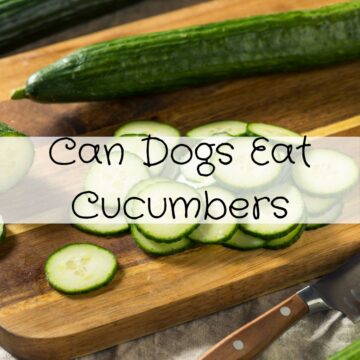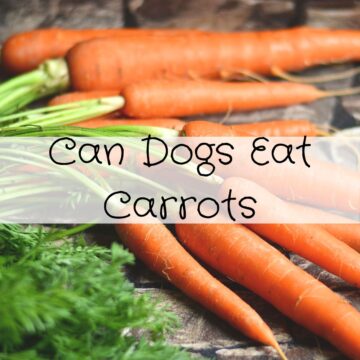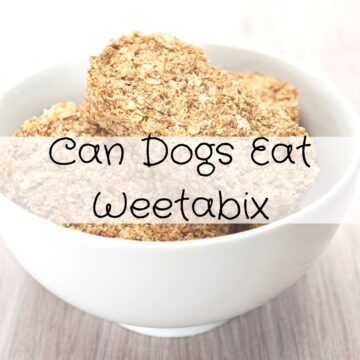Dogs are known for being loyal companions and are often considered a part of the family. As such, it’s only natural to want to share your food with your furry friend. However, not all human food is safe for dogs to consume. One such food is cooked pork.

This post may contain affiliate links. Please read my disclosure policy for more information.
Jump to:
CAN DOGS EAT COOKED PORK?
So, can dogs eat cooked pork? The answer is yes, but with some caveats. While cooked pork is not toxic to dogs, it is important to ensure that the pork is properly cooked and that the dog is not allergic to pork.
Cooked pork is generally safe for dogs to eat, as long as it is not cooked with any harmful ingredients such as onions, garlic, or spices. These ingredients can be toxic to dogs and can cause a range of health problems such as anemia, vomiting, diarrhea, and more.
CAN DOGS EAT GROUND PORK?
Dogs can eat ground pork, but like all types of pork, it should be fed in moderation and prepared properly. Ground pork can be a good source of protein for dogs and can be included as part of a balanced and varied diet.
CAN DOGS EAT RAW PORK?
It is not recommended to feed dogs raw pork due to the risk of harmful bacteria and parasites, as well as the high fat content. If you are interested in feeding your dog a raw diet, it is important to work with a veterinarian or canine nutritionist to ensure that it is safe and nutritionally balanced.
CAN I GIVE MY DOG PORK BONES?
It is generally not recommended to give dogs pork bones. Pork bones can splinter easily and can pose a choking hazard or cause gastrointestinal issues if ingested. Additionally, pork bones can cause damage to a dog’s teeth or gums if they are too hard or if a dog chews on them aggressively.
CAN A DOG EAT HAM OR BACON?
It is generally not recommended to feed dogs ham or bacon as these meats are high in salt, fat, and calories, which can lead to obesity, digestive problems, and other health issues in dogs if consumed in excess.
Additionally, ham and bacon can also contain harmful preservatives and additives such as nitrates and nitrites, which can cause digestive problems, and may increase the risk of certain types of cancers in dogs.
CUTS OF PORK
It is also important to note that certain cuts of pork can be high in fat, which can lead to obesity and other health problems in dogs. As such, it is important to feed pork to your dog in moderation and to avoid feeding them pork that is excessively fatty.
COOKING CAUTION
Additionally, it is important to ensure that the pork is cooked thoroughly. Undercooked pork can contain harmful bacteria such as Salmonella and E. coli, which can be dangerous to both dogs and humans. To be safe, it is recommended to cook pork to an internal temperature of at least 145 degrees Fahrenheit.
HOW TO FEED PORK TO YOUR DOG
If you want to feed pork to your dog, it is important to prepare it properly and feed it in moderation.
- Cook the pork thoroughly
- Avoid seasoning the pork with ingredients that can be toxic to dogs, such as onions, garlic, and spices.
- Cut the pork into small pieces - When feeding pork to your dog, it is best to cut it into small, bite-sized pieces to make it easier for your dog to chew and digest.
- Feed pork in moderation - While pork can be a good source of protein for dogs, it is also high in fat and calories. Feeding too much pork can lead to obesity and other health problems in dogs. As a general rule of thumb, pork should make up no more than 10% of your dog’s daily diet.
Remember to go slowly when introducing new foods. And we recommend checking with your veterinarian first if your dog has any digestive issues or other health concerns.
PORK ALLERGY
Additionally, is important to make sure that your dog is not allergic to pork before feeding it to them. Signs of a pork allergy in dogs can include itching, hives, and gastrointestinal problems. If your dog exhibits any of these symptoms after consuming pork, it is best to consult with a veterinarian.
Recipes for Dogs with Pork
CONCLUSION
In conclusion, while cooked pork is generally safe for dogs to eat, it is important to ensure that the pork is properly cooked, does not contain any harmful ingredients, and is fed in moderation. It is also important to make sure that your dog is not allergic to pork before feeding it to them. As always, it is best to consult with a veterinarian if you have any concerns about your dog’s diet or health.






Leave a Reply